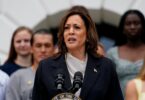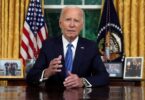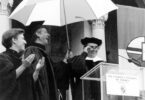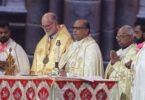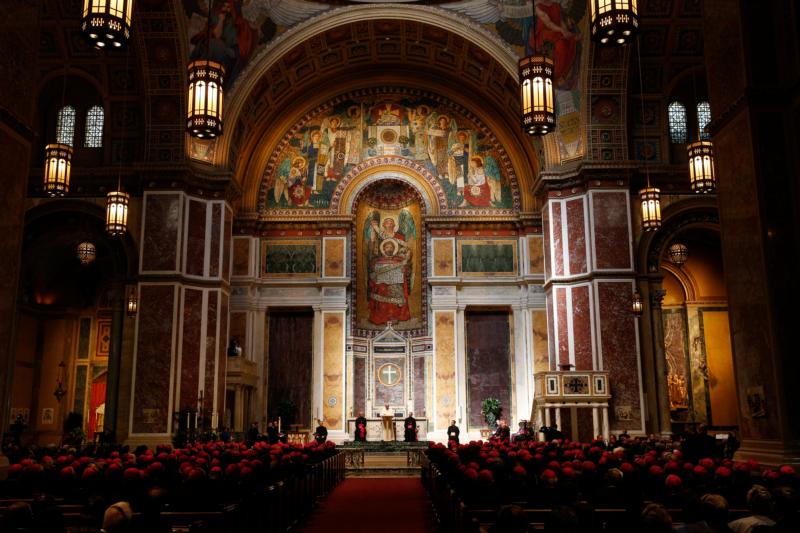
Pope Francis meets with U.S. bishops in the Cathedral of St. Matthew the Apostle in Washington Sept. 23. (CNS photo/Paul Haring)
WASHINGTON (CNS) — Acknowledging the real challenges and burdens the U.S. bishops face in their ministry, Pope Francis shared with them his own experience as a pastor and urged them to keep their eyes focused on Jesus and their hearts open to others.
“Woe to us,” he said, “if we make of the cross a banner of worldly struggles and fail to realize that the price of lasting victory is allowing ourselves to be wounded and consumed.”
The 78-year-old pope met the U.S. bishops Sept. 23 in Washington’s Cathedral of St. Matthew the Apostle for midday prayer. His speech to them, delivered in Italian, was expected to be among the longest of those he would give in the United States.
“I did not come to judge you or to lecture,” the pope said, but he wanted to address the bishops “as a brother among brothers, ” one who served as archbishop of a large, diverse archdiocese and now, “in old age,” is called to encourage Catholics around the world.
Archbishop Joseph E. Kurtz, president of the U.S. bishops’ conference, welcomed Pope Francis, telling him, “Your humble witness that no one is beyond the healing power of Christ’s mercy and love energizes the church. True to our heritage, we seek to spread the Good News so that each human life is cherished and given an opportunity to flourish.”
The pope also was welcomed by Washington Cardinal Donald W. Wuerl, who rode with Pope Francis in the popemobile part of the way from the White House to the cathedral.
A majority of the country’s more than 400 bishops were present for the meeting. Many of them, after arriving in a bus caravan, stopped to take photos with their smartphones of a cream-colored sign above the center cathedral doors that read, “Welcome Pope Francis.”
Dozens of office workers in high-rise buildings around the cathedral pressed their faces or smartphones to the glass windows in hopes of getting a better glimpse and photo of the pontiff on the steps leading up the cathedral.
In his speech, Pope Francis focused on the basic qualities needed in a shepherd, a pastor called to share the good news of Jesus Christ and God’s mercy in word and deeds.
The Catholic Church in the United States already excels at that mission in so many ways, the pope told them. “Whenever a hand reaches out to do good or to show the love of Christ, to dry a tear or bring comfort to the lonely, to show the way to one who is lost or to console a broken heart, to help the fallen or to teach those thirsting for truth, to forgive or to offer a new start in God … know that the pope is at your side and supports you.”
He also praised the bishops’ defense of the unborn and the U.S. Catholic community’s history of welcoming and assisting migrants and refugees.
Pope Francis also acknowledged the “courage” and the “mortification and great sacrifice” made by the U.S. bishops as they came to grips with the clerical sexual abuse crisis and its impact on survivors.
“I realize how much the pain of recent years has weighed upon you, and I have supported your generous commitment to bring healing to victims — in the knowledge that in healing we, too, are healed — and to work to ensure that such crimes will never be repeated,” he said.
At the same time, Pope Francis insisted that no matter the challenge, the misunderstanding and even hostility the bishops face, they cannot stop “to lick one’s wounds, to think back on bygone times and to devise harsh responses to fierce opposition.”
The ministry with which they have been entrusted is God’s, not theirs, he said.
Compassion, joy, inclusivity, simplicity, dialogue, self-giving, mercy and humility must mark a bishops’ ministry, the pope told them.
“As pastors, we know well how much darkness and cold there is in this world,” he told them. But the church can attract people by being “the family fire” that offers warmth, comfort and community.
To do that, the church must be certain of “the embers” of Christ’s presence, “kindled in the fire of his passion,” he said. “Whenever this certainty weakens, we end up being caretakers of ash, and not guardians and dispensers of the true light and the warmth which causes our hearts to burn within us.”
Sharing the faith, he said, “is not about preaching complicated doctrines, but joyfully proclaiming Christ who died and rose for our sake.”
People need to know that the message is for them, not for an abstract group, or worse, for a group of like-minded people, Pope Francis insisted. “May the word of God grant meaning and fullness to every aspect of their lives; may the sacraments nourish them with that food which they cannot procure for themselves; may the closeness of the shepherd make them long once again for the Father’s embrace.”
Bishops, he said, must “flee the temptation of narcissism” and recognize that “we fall into hopeless decline whenever we confuse the power of strength with the strength of that powerlessness with which God has redeemed us.”
Encounter and dialogue must be the hallmarks of a bishop’s interactions with others, especially with those who hold differing opinions, the pope said. Dialogue is not “a shrewd strategy” but the path Jesus chose to offer his love to all people.
Without listening and dialogue, he said, “we fail to understand the thinking of others or to realize deep down that the brother or sister we wish to reach and redeem with the power and the closeness of love, counts more than their positions, distant as they may be from what we hold as true and certain.”
“Harsh and divisive language does not befit the tongue of a pastor,” Pope Francis said. “It has no place in his heart; although it may momentarily seem to win the day, only the enduring allure of goodness and love remains truly convincing.”

